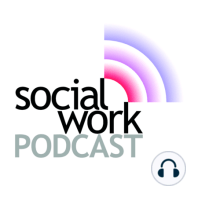35 min listen

Music, positive youth development, and homelessness: Interview with Brian Kelly, Ph.D.
Music, positive youth development, and homelessness: Interview with Brian Kelly, Ph.D.
ratings:
Length:
40 minutes
Released:
Sep 22, 2014
Format:
Podcast episode
Description
Episode 92: Today's episode of the Social Work Podcast looks at an innovative approach to developing strengths and resilience in youth experiencing homelessness - a music studio housed within an agency. I speak with Brian Kelly, Ph.D., assistant professor at Loyola University Chicago. Brian briefly describes factors that put youth at risk for homelessness and the three levels of services provided to homeless youth. We end with Brian playing some clips from the audio documentary, and discussing how the music provides insight into the youths' lives.
You can connect with other social workers at the Social Work Podcast Facebook page, http://www.facebook.com/swpodcast, or follow the Twitter feed http://www.twitter.com/socworkpodcast. You can listen to the Social Work Podcast from socialworkpodcast.com, by downloading the episodes through iTunes or any number of other apps, or you can stream the 10 most recent episodes right from your mobile device using the Stitcher Radio mobile app http://www.stitcher.com/podcast/social-work-podcast/the-social-work-podcast.
You can connect with other social workers at the Social Work Podcast Facebook page, http://www.facebook.com/swpodcast, or follow the Twitter feed http://www.twitter.com/socworkpodcast. You can listen to the Social Work Podcast from socialworkpodcast.com, by downloading the episodes through iTunes or any number of other apps, or you can stream the 10 most recent episodes right from your mobile device using the Stitcher Radio mobile app http://www.stitcher.com/podcast/social-work-podcast/the-social-work-podcast.
Released:
Sep 22, 2014
Format:
Podcast episode
Titles in the series (100)
Ep. 3: Crisis Intervention and Suicide Assessment for Social Workers: Part 1 by The Social Work Podcast